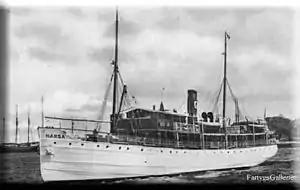SS Hansa (1899)
The Hansa was a Swedish passenger ship, in use on the route between the Swedish mainland and Visby. She was torpedoed and sunk by a Soviet submarine in 1944, during World War II.
 | |
| History | |
|---|---|
| Name: | SS Hansa |
| Operator: | Ångfartygs AB Gotland, of Visby. |
| Port of registry: |
|
| Builder: | William Lindbergs Verkstads- och Varfs AB, Stockholm |
| Yard number: | 233 |
| Launched: | 16 September 1899 |
| Fate: | sunk on 24 November 1944 |
| General characteristics | |
| Tonnage: | 563 tons |
| Length: | 47.9 m |
| Beam: | 7.8 m |
| Draught: | 3.9 m |
| Capacity: | 63 |
| Crew: | 23 |
Career and sinking
The Hansa was a passenger steamship built in Stockholm in 1899 for Ångfartygs AB Gotland, of Visby. She was built along luxury yacht lines and had dining room for 40 guests. In addition to sailing between the mainland and Visby, she also called at a number of other ports such as Danzig, Tallinn and Riga, during the 1930s.
On 24 November 1944, the Hansa was torpedoed and sunk between Nynäshamn and Visby by a Soviet submarine. At 05:57 a torpedo caused a large explosion, and the ship sank within a few minutes; 84 people died and two survived, including the then Swedish Army captain Arne Mohlin. The two survivors were rescued by the Swedish minesweepers Landsort and Arholma. Investigations after the war pointed to the Soviet submarine L21 as being responsible for the sinking.